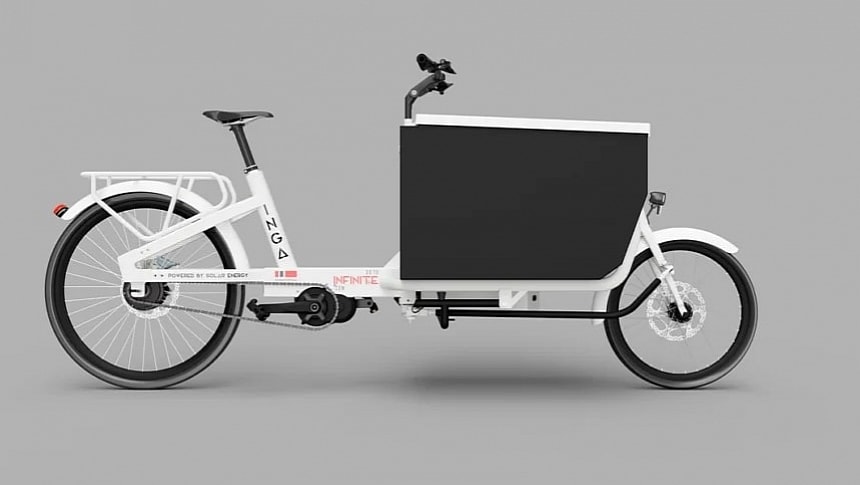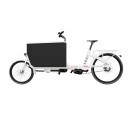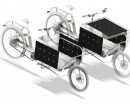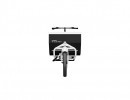The urban mobility sector is charting a path toward a better future with smarter and cleaner modes of transportation. While electric bikes running on rechargeable batteries have already become mainstream, the use of solar power as a green energy source in the bicycle realm is still little explored, mainly due to the minimalist design of most two- or three-wheelers.
However, Norwegian startup Infinite Mobility could succeed where others have failed. The company has risen to the challenge and successfully managed to incorporate solar panels onto its latest creation, an electric cargo bike called Inga.
Developing a standard e-bike with onboard solar panels is not an easy task because this kind of vehicle doesn't offer much space to work with. However, a cargo bike or trike meant to carry heavy and bulky payloads could incorporate solar panels on its storage box, and this is exactly the solution implemented by Infinite Mobility. The pioneering company has developed an electric cargo bike with solar panels installed on the cargo container that could potentially power a full day's worth of delivery trips.
Built with a steel frame, the Inga is a bakfiets-style cargo bike, meaning it has its cargo box up front. It is powered by a 250W rear hub motor from Danish e-motor company Promovec that delivers 100 Nm, and the maximum assisted speed is limited to 25 kph (15 mph). The electric motor is paired with a 36V 16.5Ah battery that should give it a range of up to 60 km (37 miles) on its own. However, riders can get up to 50 km (31 miles) of extra range from the semi-flexible solar panels integrated into the sides and top of the front box. In total, the bike is fitted with 160W of solar power, and according to Infinite Mobility's founder and CEO Moez Jomâa, the panels are built with Maxeon/Sunpower interdigitated back contact (IBC) solar cells.
"We chose IBC cells as they are aesthetically pleasing yet powerful enough for the application. In fact, there is a very good match between energy harvested from solar PV and energy required to power the bike," he explained in a statement.
The above numbers might seem modest, given that there are electric bikes out there designed to cover far greater distances, but the biggest benefit offered by Inga is that riders will be constantly recharging while biking around on sunny days. The more the bike stays in the sun, the greater the range. Actually, Jomâa claims that an hour in the sun is enough for at least 8 km (5 miles) of riding, and the battery can be recharged from zero to full if the bike is exposed to sun rays all day long.
In terms of payload, Inga boasts an impressive cargo capacity of up to 250 kg or approximately 550 pounds.
The Inga solar-powered cargo bike is expected to go into production starting next month, and for now, the Scandinavian manufacturer has sent prototypes to select bike shops across Europe for testing. No pricing or release date details have been revealed just yet.
The company is also working on another model called Løkka, suitable for last-mile deliveries in large cities. This second solar-powered cargo bike has a three-wheel design and a much larger storage capacity that will allow for up to 550W of integrated solar power.
Watch a short intro video of Inga below.
Developing a standard e-bike with onboard solar panels is not an easy task because this kind of vehicle doesn't offer much space to work with. However, a cargo bike or trike meant to carry heavy and bulky payloads could incorporate solar panels on its storage box, and this is exactly the solution implemented by Infinite Mobility. The pioneering company has developed an electric cargo bike with solar panels installed on the cargo container that could potentially power a full day's worth of delivery trips.
Built with a steel frame, the Inga is a bakfiets-style cargo bike, meaning it has its cargo box up front. It is powered by a 250W rear hub motor from Danish e-motor company Promovec that delivers 100 Nm, and the maximum assisted speed is limited to 25 kph (15 mph). The electric motor is paired with a 36V 16.5Ah battery that should give it a range of up to 60 km (37 miles) on its own. However, riders can get up to 50 km (31 miles) of extra range from the semi-flexible solar panels integrated into the sides and top of the front box. In total, the bike is fitted with 160W of solar power, and according to Infinite Mobility's founder and CEO Moez Jomâa, the panels are built with Maxeon/Sunpower interdigitated back contact (IBC) solar cells.
"We chose IBC cells as they are aesthetically pleasing yet powerful enough for the application. In fact, there is a very good match between energy harvested from solar PV and energy required to power the bike," he explained in a statement.
In terms of payload, Inga boasts an impressive cargo capacity of up to 250 kg or approximately 550 pounds.
The Inga solar-powered cargo bike is expected to go into production starting next month, and for now, the Scandinavian manufacturer has sent prototypes to select bike shops across Europe for testing. No pricing or release date details have been revealed just yet.
The company is also working on another model called Løkka, suitable for last-mile deliveries in large cities. This second solar-powered cargo bike has a three-wheel design and a much larger storage capacity that will allow for up to 550W of integrated solar power.
Watch a short intro video of Inga below.









